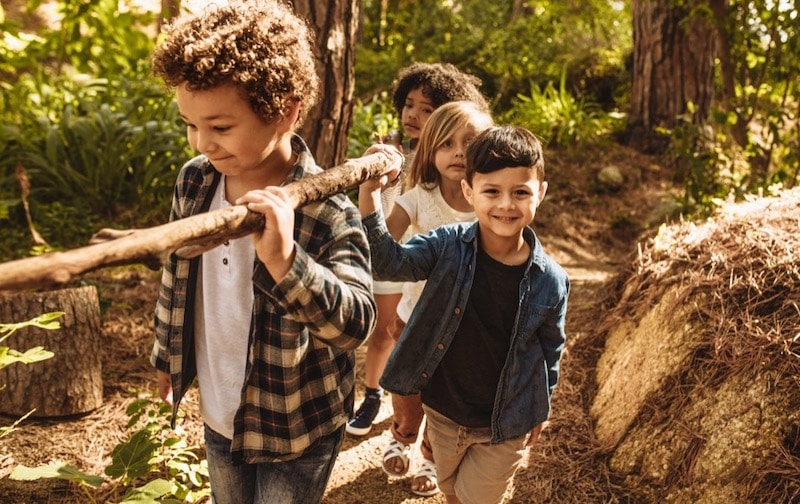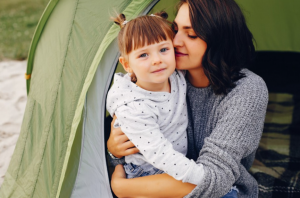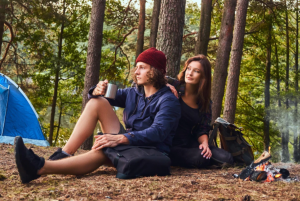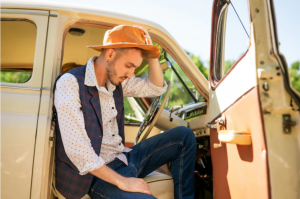When children learn to camp at a young age, they develop important memories that they will always hold on to and cherish. They will learn to enjoy and respect nature and ask questions about what they see. People who spend too much time indoors forget about the beauties and joys of the natural world, and camping—or even glamping—also teaches important life skills and provides fresh air and exercise. It’s never too late to get started, but the sooner you start, the sooner you can begin building memories.
What We'll Cover
- Kid Safety
- Pack the Right Clothes
- Only Drink Purified Water
- Teach Kids About Dangers
- Camping Tools Aren’t Toys
- Fire Safety
- What To Do In an Emergency
- Let Kids Help Pack and Set Up Camp
- Have a Meal Plan Prepared
- Fun Activities Kids Will Love
- Scavenger Hunt
- Shadow Puppets
- Cooking Over the Fire
- Camping Bingo
- Corn Hole
- More Fun Games for Families
- Remember, Camping Is Messy
- Conclusion
Kid Safety
Before you go out and do the real thing, practice camping at home. It will give your children a chance to see what the conditions will be like without the pressures and fears that come with the unknown. You can even start out with camping activities indoors before moving to the backyard. Then you can go to a national park or lake for short visits, such as a half-day experience.
Pack the Right Clothes
Packing the right camping gear is important, so make sure you bring the right clothes for the weather and conditions. If the children aren’t protected from the elements, they won’t enjoy themselves and they could even get sick. If you are going to be hiking, make sure the children have supportive shoes. They can be injured if their shoes aren’t supportive. Lightwood wool socks will protect their feet and dry more quickly than regular socks.
A sun hat will protect skin and eyes from the harsh rays of the sun, and can easily be cleaned and strapped on. Long sleeves made from light material will protect their vulnerable skin, and there are even clothes which can repel bugs. Use bug repellent spray, because they won’t enjoy themselves if they are covered with itchy bug bites.
Only Drink Purified Water
Unfortunately, you don’t always know what is in a water source. You can’t depend on a stream being safe and free from impurities. Even water that looks fine may be full of bacteria. Camping water bottles may be too heavy to carry, but you can bring a good water filter or chemical tablets to purify the water you find in streams while camping to help your kids stay hydrated while camping.
Teach Kids About Dangers
Start with books and discussions first before introducing your children to dangers in real life. Let your children know how varied and fascinating nature is, but that not everything in nature is safe. Talk to them specifically about some of the dangers they might not think of:
- Dangers are everywhere, and even touching plants can be hazardous to your health. Everyone knows about poison ivy and poison sumac, which can cause a rash—or even worse—if you are sensitive. Not everyone knows how to identify these kinds of plants, so it is best to show your children pictures and then point them out when you see them in real life. Emphasize that you shouldn’t get too close, because even touching them can cause a reaction.
- There are wild animals in nature, and that is their home. Your children need to learn to respect the denizens of the forest while understanding the children are visitors. You can find out which animals frequent the area where you plan to go camping, how to keep animals out of your campsite, and talk about the best way to respect the space of the creatures who live there.
- Don’t eat any foraged foods without permission! Even if you think you know what something is, don’t eat it unless you are absolutely sure. Guides will help you identify which wild berries are safe, but even with a guide, you can make a mistake when faced with something you haven’t seen before.
- Try to choose appropriate activities for your kids to do. While something like caving is a lot of fun for adults, young kids can potentially get hurt. Make sure your children are physically ready for activities before signing up for them.
Camping Tools Aren’t Toys
Many of the tools that make camping easier are dangerous for children to play with. They may want to try to handle the tools, like the camping generator themselves, which could lead to serious injuries. It’s always better to let children know how they can help with all the tasks so they are less tempted to take on more than they can handle. If it helps, make a chart which shows what each person is responsible for. If children are curious about your camping tools, give them information and instruction and let them know that they will be able to take on that responsibility for themselves later. As with other dangers, make sure the children are always supervised around anything dangerous.
Fire Safety
The number one rule with kids and campfire safety is supervision! Make sure kids can’t get to lighters and matches, and keep the fire in the place where it belongs, such as a fire pit. This may seem like a no brainer, but you may have habits from spending time with the children before, or it may seem safe to leave a child by a bonfire while caring for another child. It only takes a few seconds for things to go very wrong when it comes to fire, and it is important to stay conscious of the possible dangers as long as the fire is alive. If you’re uncomfortable with your child being around a fire for extended periods of time, consider using a camping heater to keep them warm.
Grownups can set a good example for the children by being serious around every fire. If you want to roughhouse or even just pass a ball back and forth, make a point about moving to a safe distance away from the fire. Help smaller children by helping to hold the deliberately long sticks when you roast s’mores together on your marshmallow roasting sticks, and make sure older children are far enough away at all times.
Once you no longer have use for the fire, you should take great care to put it out. Keep a shovel and a bucket of water close at all times in case you need to put the fire out quickly, and start putting the fire out at least 30 minutes before you plan to move away from the campsite. That way, you can make sure to catch any live embers you may have missed the first time.
What To Do In an Emergency
Even a short camping trip can end in tragedy. Make sure your children understand what to do in case of an emergency. Especially while camping, you may not be in cell phone range and able to call for help. Get whistles they can wear around their necks so they can give three sharp blasts if they are lost or need help. Keep a camping first aid kit handy for minor medical emergencies, as well as a camping survival kit to tackle emergencies in the wild. Most importantly, talk to them beforehand so they know what to expect.
Let Kids Help Pack and Set Up Camp
Make a checklist of everything you need and let your children help out. Your checklist can include everything from the tent to the camping lantern or solar camping lantern to your camping utensils. When your children help out, they will learn to be more responsible and they will feel more part of the trip. Also, have them practice keeping items where they belong, so nothing gets lost when you are out.
Have a Meal Plan Prepared
You don’t have to sacrifice healthy meals because you’re camping. If you plan ahead for your camping trip, you can bring all the ingredients for easy-to-prepare-but-delicious camping recipes. Make sandwiches at home, bring the right camping cookware, and learn how to prepare eggs, burritos, and kabobs with a campfire. You may end up wishing you could always eat so well.
Bring Snacks
The best snacks will be healthy, delicious, and high in energy. Trail mix, dehydrated foods, and beef jerky taste great and stay safe without refrigeration. You can even find recipes online to make great snacks like homemade granola bars and fruit leather.
Fun Activities Kids Will Love
You don’t just bring kids camping so you can be somewhere else—you bring them out to show them they can have fun without the distractions of television, videogames, and smartphones. There is so much to do that you should never be bored, and you can get ready ahead of time by preparing the games and outdoor activities for children you want to share. Most of the games and activities are far less expensive than comparable games back home, and the children can also learn a lot about nature and science while having a great time, learning to appreciate the great outdoors.
Scavenger Hunt
You can tell the kids it’s just a fun game, but scavenger hunts are also very educational. Depending on the age of the children and what they already know, you can make a list of either very simple items (like acorns or pine cones) or harder (like specific flowers or trees, or certain kinds of animal tracks). Remind your campers that they are to leave things as they find them, and not to deliberately pick flowers or otherwise tamper with the natural order.
Shadow Puppets
It’s so easy to set up a shadow puppet show, and it can be the highlight of your camping trip. All you need to get started is a flashlight, and then you can use your imagination to create characters and even shows. Some great animals you can easily create are a wolf, rat, donkey, or rabbit.
Cooking Over the Fire
- S’ mores is one of the most popular camping pastimes. S’mores are great because they’re so easy to make over the fire, and they are so rich and delicious. All you need to make the delicious treat are candy bars, marshmallows, and graham crackers, and you can melt the marshmallow over the campfire to use to hold your sandwich together.
- Hotdogs are a favorite because they are quick and filling, but other delicious foods to cook over the campfire include corn on the cob, fruit, bread, and even grilled cheese. Be careful that you don’t drop thse sandwiches into the fire! You can have traditional camp foods and get your vitamins too, so you don’t have to feel guilty about your delicious treats.
Camping Bingo
You can buy a camping bingo game or print your own cards online. Camping bingo is fun because you can take an already familiar game and add in some new fun by making the spaces camping words, like flashlight, tent, bird nest, and tree. Instead of having someone call out the items on the card, you can walk around and find each item. You can either choose a winner as the first person to get a whole row or see who can fill up the whole card!
Corn Hole
Corn Hole can be a fun game to play outside or inside. You can even design and make your own camping-themed corn hole games, which can be played with bean bags, bags, or anything else easy to throw. The rules are simple: players can play individually or in teams, and they take turns throwing into the target to see who gets the most hits. Players have to stand within the throwing area, and the first person or team to get to 21 wins that game. Players get 3 points for going into the hole and 1 point for hitting and staying on the board. Corn hole games can bring out a lot of energy.
More Fun Games for Families
There are too many great games to mention in one article, but some of the best ones include Flashlight Tag, which is basically tag with a flashlight, Red Light/Green Light, and Hiking Stick Limbo. There are almost unlimited games, and you can even take games you already play at home and adapt them for camping.
Remember, Camping Is Messy
If you’re worried about your kids getting messy, you won’t have a great time camping. It’s okay to get dirty, and you don’t have to feel like you need to clean up every time your children get dirt on them or drop food on their clothes. Kids are going to get messy at the best of times, and they will enjoy camping more once they learn that they don’t have to worry about being messy while they are camping. Don’t freak out! Instead, laugh when you see a mess and let them know that they can enjoy themselves.
Conclusion
If you do camping right, the children you bring will learn they have everything they need to live and enjoy themselves while they are out. They won’t even notice they are having an educational experience, and they will get much-needed exercise and fresh air. If you bring a variety of foods, you can even cook nutritional meals over your own campfire.
The responses below are not provided, commissioned, reviewed, approved, or otherwise endorsed by any financial entity or advertiser. It is not the advertiser’s responsibility to ensure all posts and/or questions are answered.


![Tips to Go Camping With a Toddler [Different Weather]](/assets/images/375a17532f44c72a41d33b1008823cf3.png)


